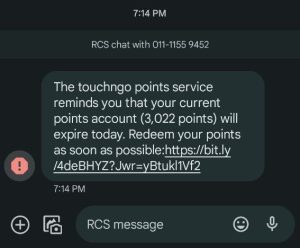“SMS” Phishing on the Rise: A Growing Threat in Malaysia
Posted: April 28th, 2024 | Author: xanda | Filed under: IT Related | No Comments »In recent years, Malaysia has witnessed a surge in “SMS” phishing (also known as smishing) attacks. These deceptive messages target unsuspecting individuals via text messages, luring them into revealing sensitive information or clicking on malicious links. Let’s delve into the key aspects of this growing threat:
1. The Prevalence of SMS Phishing
According to a survey conducted by international market research firm Ipsos, more than two-thirds of Malaysians (76%) have encountered scams at some point in their lives. Among the communication channels exploited by scammers, phone calls and WhatsApp applications take the lead. SMS phishing accounts for a significant portion, with 56% of respondents reporting such incidents. The remaining channels include Facebook (31%), Telegram (30%), and SMS text (29%).
2. Evolving Tactics
The modus operandi of SMS phishing has evolved over time. Initially, scammers targeted traditional SMS messages, but as telcos in Malaysia began blocking SMS containing URLs, fraudsters adapted. Recent campaigns have shifted focus to Apple iMessage and Android RCS (Rich Communication Services), which technically aren’t SMS but operate within similar messaging platforms. Additionally, spoofed SMS via fake base transceiver stations (BTS) have emerged, further complicating the landscape.
3. The TNG eWallet Scam
Recently, the theme of SMS phishing has shifted from parcel services and telco-related scams to TNG eWallet. Victims receive messages claiming that their loyalty points are about to expire, urging them to redeem by clicking a link. However, these links lead to fraudulent websites designed to steal personal information, including campaigns aimed at hijacking Telegram accounts. The shift to TNG eWallet reflects scammers’ adaptability and their ability to exploit popular services.
4. Reporting and Awareness
Despite the prevalence of SMS phishing, fewer than half of victims report the incidents to authorities. The police receive the majority of complaints (62%), while other agencies like the Malaysian Communications and Multimedia Commission (MCMC), CyberSecurity Malaysia, and Bank Negara Malaysia receive fewer reports. Raising awareness and empowering the public with education and digital safeguards are crucial steps in combating this menace.
5. Indicators of Compromise
Indicators of Compromise (IOCs) for the latest campaign should include relevant and enriched indicators:
touchngo-z.top globeih.top globein.top telkomsel-og.top telkomsel-oj.top maxis-l.top globeig.top emag-k.top telkomsel-om.top telkomsel-ok.top ais-g.top ais-h.top ais-f.top ais-d.top globeij.top etisalat-z.top telkomsel-oz.top telkomsel-on.top telkomsel-ox.top telkomsel-ov.top telkomsel-os.top telkomsel-oq.top telkomsel-id.com dpd-a.top emag-q.top dpd-c.xyz dpd-a.vip globeif.top globeiv.top globeix.top globeid.top globeia.top globeic.top globeiz.top globeib.top globeis.top emag-w.top telkomseip.top telkomseie.top telkomseit.top telkomseiw.top telkomsexx.top telkomseiq.top telkomseir.top telkomseiy.top telkomsexz.top telkomsexc.top telkomseio.top telkomsexv.top telkomseiu.top maltapost-x.top telkomselia.top telkomselic.top cambodiapostv.top telkomselim.top telkomselil.top telkomselib.top telkomselik.top telkomselij.top ais-j.top telkomselin.top |


Leave a Reply